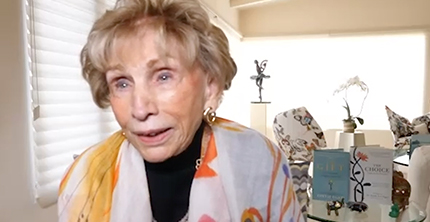“Everything can be taken away from us except what we put in our own mind.” These were among the last words Dr Edith Eva Eger remembers her mother saying to her as they rode in a cattle cart to the Nazi death camp.
The 93-year-old American psychologist and bestselling author has drawn from her experience in one of the worst episodes of genocide in human history this philosophy: “think about your own thinking”.
“Don’t call me shrink, call me stretch. I want to stretch people’s minds,” she told Distinguished Professor of Leadership and Organizational Behaviour at IMD George Kohlrieser, at this year’s Global HPL Alumni Event. Speaking about the losses people have experienced during the pandemic, she explained: “The more choices you have, the less you feel like a victim. The biggest concentration camp you have is in your own mind and the key is in your pocket.”
What do you do with a bad memory?
Dr Eger knows about bad memories: she still has nightmares about Auschwitz.
“Last night I was there, but to wake up in my own bed and see I not only survived, but was able to be blessed to guide other people, well…” she told Professor Kohlrieser.
As a person who saw her own mother burning, Dr Eger has learned to sit with feelings fully, explaining: “If you have a feeling, invite it in. Stop running. We don’t overcome anything. We come to terms with it,” she said.
“The question is: when did your childhood end? We are all victims of victims, but we were victimized. It’s not who I am. It’s what was done to me.
“There is no forgiveness without rage. You must not cover garlic with chocolate,” she said, explaining that “you cannot heal what you don’t feel.”
Critically, when you’re angry, Dr Eger explained, you give your power away. That’s why she is “very selective” about who gets her anger. What’s more, she cautions others to “pay attention to what you’re paying attention to, as […] you reinforce that behavior.”
Why you have to go beneath your feelings, look your anger in the eyes
Anger is not a primary emotion, Dr Eger said. Underneath it is often a combination of pain, frustration, anxiety and fear.
Dr Eger’s close relationship with Viktor Frankl, the Austrian Holocaust survivor, neurologist and psychiatrist, gave her a way to tell people about Auschwitz.
She said Frankl, author of the bestseller Man’s Search for Meaning, based on his own experiences in Nazi concentration camps, “gave me permission to acknowledge that I was angry.”
“With anger, we vent it or suppress it. I tell you to dissolve it. We carry a lot of anger not realizing it is eating [us] up.” Through forgiveness, she says, you “liberate yourself from the pain and the hate”. And failure to do so just makes you “a hostage and a prisoner of the past”.
Echoing Anne Frank, Dr Eger said that she believes that people are basically good. When she arrived penniless in the US in 1949, she was surprised to read “colored” on the toilet doors:
“I didn’t realize that, after Nazi Germany and Communist Russia, [I had come to] America faced with racism. I joined the NAACP, and I marched with Martin Luther King. Love is not what you feel, it’s what you do. I got a hug from [him], and sang ‘We Shall Overcome’ with the Mamas and the Papas.”
‘Leadership is a calling, not a job’
Being a leader, said Dr Eger, starts with self-love and self-care, shirking narcissism.
“In Auschwitz, I discovered my inner resources because nothing came from the outside. Dependency breeds depression.”
“But as you look at leaders, how do you see the importance of caring, when set alongside the challenge of also being daring?” asked Professor Kohlrieser.
Dr Eger said she advises leaders to conjure up the image of lying on their deathbeds, feeling satisfied that no one could have replaced them, and having told people ”not what they want but [what they] needed to hear”.
No one can stop doing something without replacing it with something else, she said. In that sense, it’s not about going back but about creating a new beginning.
Dr Eger’s second book, The Gift, was published in September and is a how-to guide on becoming your own best liberator and working with unresolved grief.




